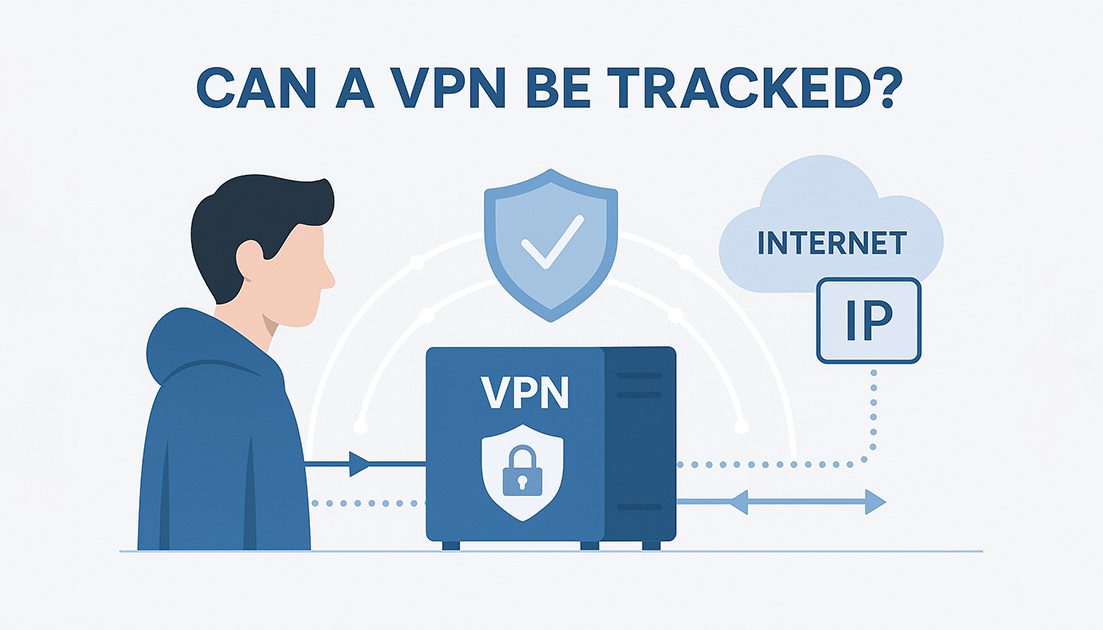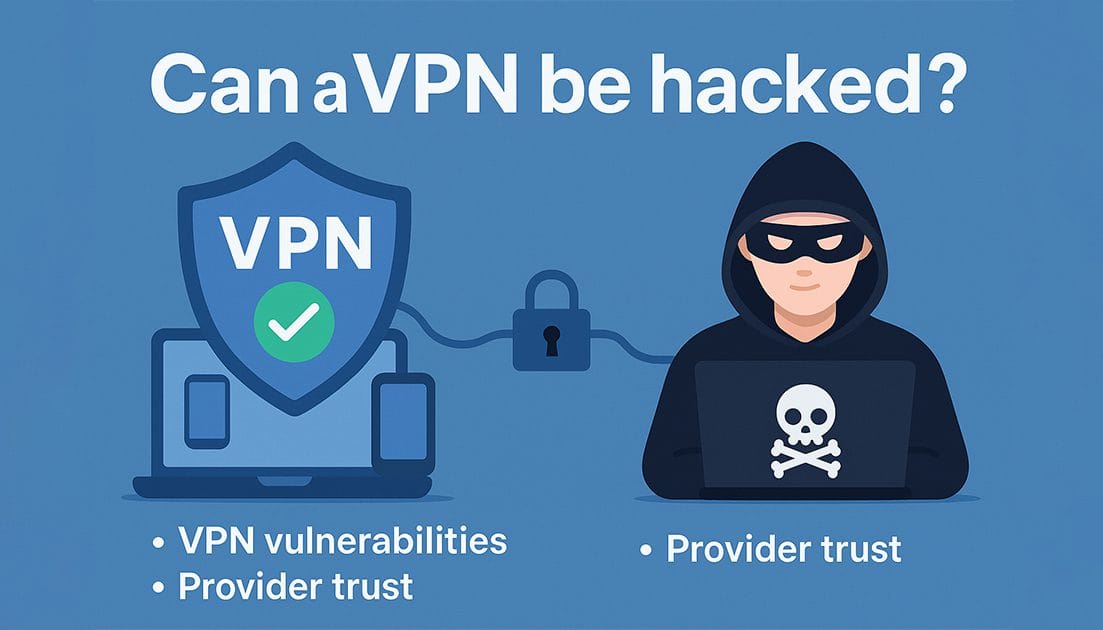VPNs are essential for privacy, security, and bypassing restrictions, but many users wonder: will VPN drain battery life, especially on mobile devices? If you’re streaming on 4G, traveling with limited charging access, or running an always-on VPN in the background, battery usage becomes a valid concern.
This guide breaks down how VPNs affect your battery, how much power they actually use, and how to minimize drain without compromising on security.
Understanding VPNs and How They Affect Battery Life
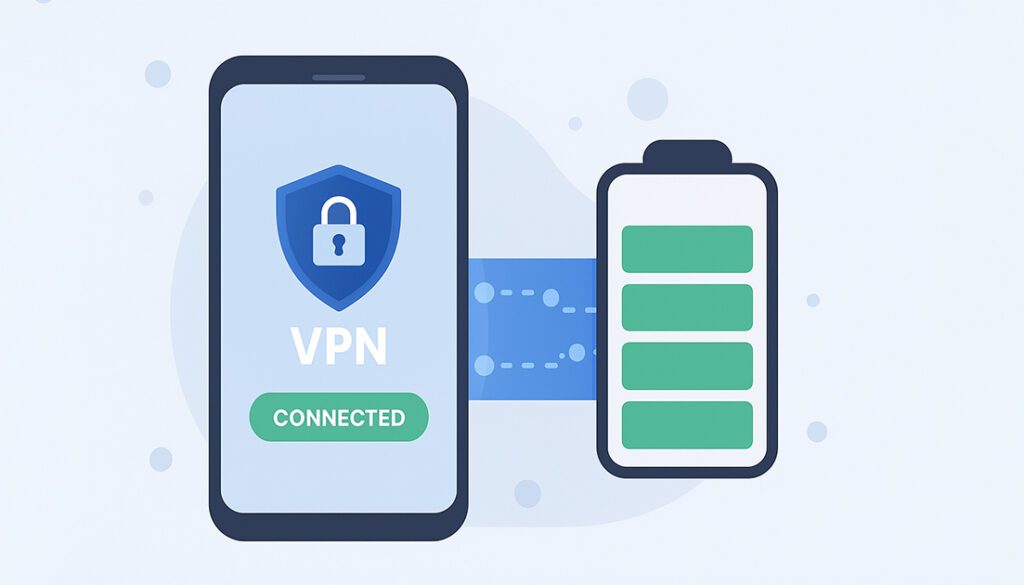
A VPN (Virtual Private Network) works by encrypting your internet traffic and routing it through a secure server. This process helps protect your data from trackers, ISPs, or hackers.
But what does this mean for your battery?
Encrypting all data before it leaves your device requires constant processing power.
The VPN connection runs in the background 24/7, maintaining a live session with a remote server.
Traffic is rerouted through additional hops, which adds more background activity and load.
These tasks happen behind the scenes, and while each one uses only a small amount of power, they can add up, especially on mobile devices with smaller batteries or when using cellular data.
Bottom line: VPNs don’t drain your battery drastically, but they do add a small power cost for the privacy they provide.
Real-World Testing: How Much Battery Do VPNs Use?

To see how much battery a VPN really consumes, we tested popular smartphones and devices: the Google Pixel 9, Samsung Galaxy S25 and the iPhone 16 with it the MacBook Pro, under different conditions.
Each phone was tested in the following scenarios:
- Idle (Wi-Fi)
- Idle (4G)
- Audio Streaming (4G)
- YouTube Playback (Wi-Fi)
We started each test with a fully charged device. And ran each scenario twice: once with the VPN off, and once with it on (using OpenVPN protocol connected to a nearby server). Here’s what we found:
| Device | Idle (Wi-Fi) | Idle (4G) | Audio Streaming (4G) | YouTube Streaming (Wi-Fi) |
|---|---|---|---|---|
| Google Pixel 9 | +0.4%/hr | +0.6%/hr | +1.1%/hr | +1.8%/hr |
| Samsung Galaxy S25 | +0.5%/hr | +0.7%/hr | +1.3%/hr | +2.0%/hr |
| iPhone 16 | +0.3%/hr | +0.5%/hr | +1.0%/hr | +1.6%/hr |
| MacBook Pro | +0.2%/hr | N/A | +0.8%/hr | +1.5%/hr |
Note: These values represent the additional battery drain per hour when using a VPN compared to not using one. Actual results may vary based on specific usage patterns and settings.
- Idle (Wi-Fi): VPN adds around 0.3–0.6% more drain per hour
- Idle (4G): VPN adds around 0.5–0.7% more drain per hour
- Audio Streaming (4G): VPN increases battery usage by 1.0–1.3%
- YouTube Streaming (Wi-Fi): VPN adds around 1.5–2.0% more drain per hour
🧠 What Does This Mean?
In most cases, the battery impact of a VPN is less than 2% per hour, depending on your activity. While the drain is real, it’s not dramatic. In fact, using a lightweight VPN protocol like WireGuard could reduce this impact even further.
Factors That Influence VPN Battery Drain
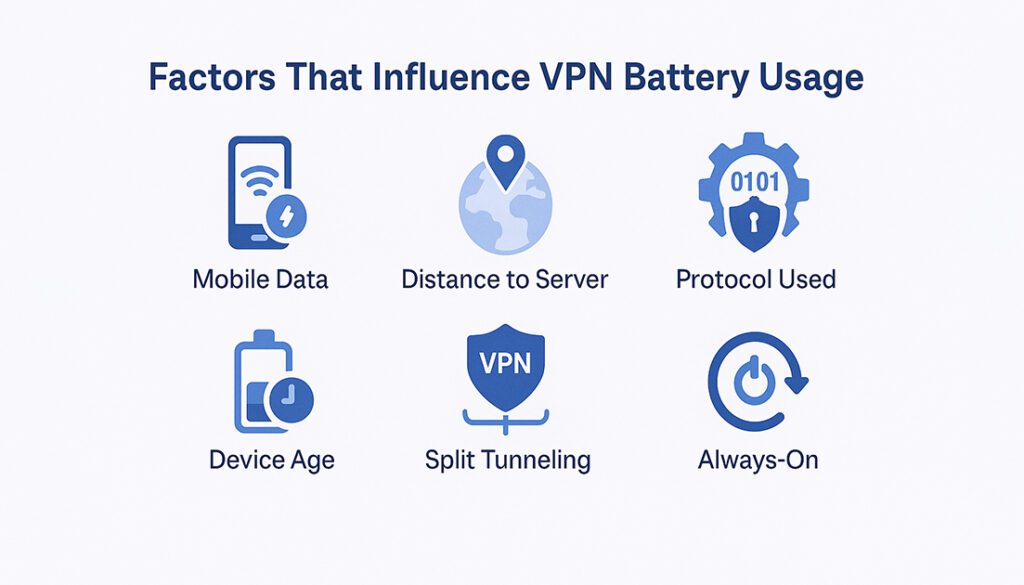
Not all VPN usage affects your battery the same way. Several factors determine how much energy your device consumes while a VPN is running.
📶 1. Network Type: Wi-Fi vs. Mobile Data
Using a VPN over mobile data drains more battery than over Wi-Fi. This is because your device works harder to maintain a stable connection, especially when signal strength fluctuates.
🌍 2. Distance to VPN Server
The farther the server, the more your device needs to maintain and reroute encrypted traffic. Always choose a nearby server when possible to reduce latency and energy use.
🔌 3. VPN Protocol Used
Some protocols are more energy-efficient than others.
Here’s a quick comparison:
WireGuard → IKEv2/IPSec → OpenVPN → SSTP
⚙️ 4. Always-On VPN or Auto-Reconnect
Keeping your VPN active 24/7 increases background activity. Features like auto-reconnect, while useful for privacy, can impact standby battery life.
📱 5. Device Age and Performance
Older smartphones or tablets with limited processing power may use more battery when running encrypted VPN sessions. Newer chips handle encryption more efficiently.
🧩 6. Extra VPN Features
Some additional features like kill switches, DNS leak protection, or split tunneling run persistent background checks, increasing the battery load slightly.
Tips to Reduce VPN Battery Usage
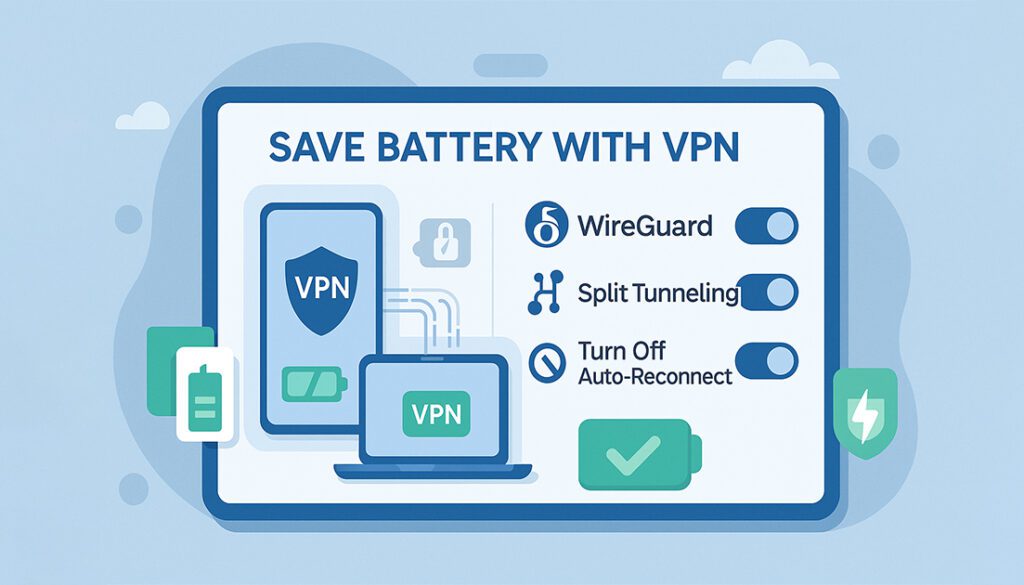
You don’t have to choose between privacy and power. These practical tips can help you get the best of both, strong VPN protection with minimal battery drain.
- ✅ Use lightweight protocols like WireGuard or IKEv2 instead of OpenVPN
- ✅ Turn off the VPN when it’s not needed (e.g., at home on a trusted network)
- ✅ Choose nearby servers to reduce latency and power usage
- ✅ Enable Split Tunneling to exclude low-risk apps like Spotify or YouTube
- ✅ Switch to Wi-Fi instead of mobile data when available
- ✅ Disable auto-reconnect or kill switch when you don’t need full-time protection
- ✅ Keep your VPN app and phone OS updated for performance and efficiency fixes
Security vs. Battery – Should You Sacrifice One?
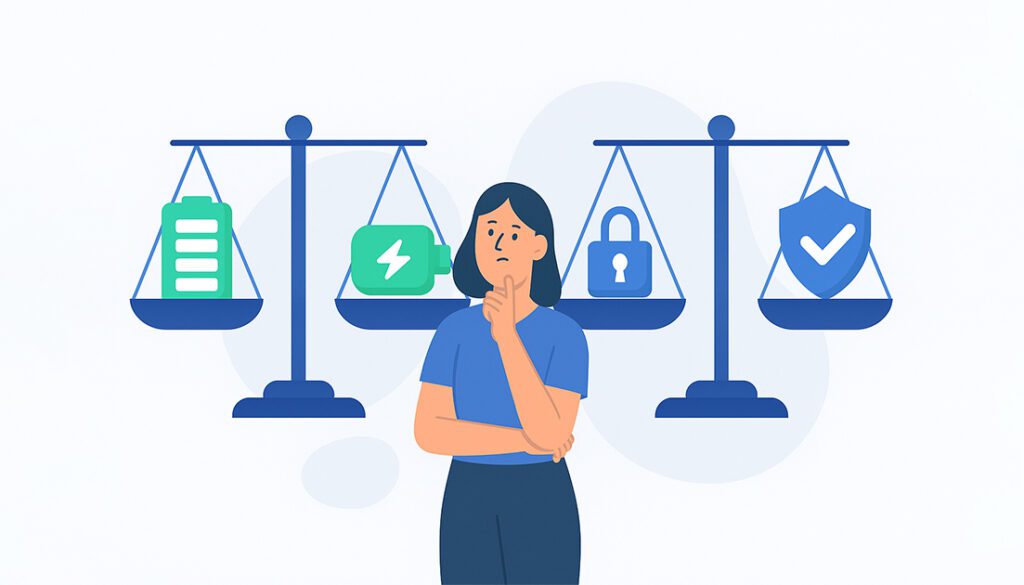
When it comes to battery life, turning off your VPN might seem like the simplest solution. But doing so could expose your data to trackers, ISPs, or malicious actors, especially on public Wi-Fi or while traveling.
The good news is you don’t have to make a hard choice.
🔐 When Security Should Come First:
- Accessing sensitive accounts (banking, work emails)
- Using public or hotel Wi-Fi
- Traveling abroad where censorship or surveillance is a concern
🔋 When It’s Okay to Prioritize Battery:
- Watching YouTube at home on a trusted network
- Listening to podcasts through apps that don’t track usage
- Casual browsing where anonymity isn’t critical
VPNs are tools, you can use them strategically. For example, Split Tunneling allows you to route sensitive traffic through the VPN while letting non-essential apps bypass it, helping conserve battery without compromising your privacy.
Best VPNs for Maintaining Battery Life

If you want strong protection without killing your phone battery, choosing the right VPN provider makes all the difference. The best VPNs for battery life use efficient protocols, offer split tunneling, and keep background activity to a minimum.
Here are some top picks:
✅ Surfshark
- Supports WireGuard (very battery-friendly)
- Has split tunneling on Android
- Lightweight apps for Android, iOS, and Mac
✅ NordVPN
- Uses NordLynx (WireGuard-based)
- Great power optimization on mobile
- Advanced battery control in the settings
✅ Mullvad
- Open-source, minimalist app design
- WireGuard only = high efficiency
- No background bloat or auto-marketing
These VPNs strike the right balance between performance and power efficiency. Whether you’re streaming, browsing, or working on the go, choosing the right provider helps you stay protected without constantly hunting for a charger.
Frequently Asked Questions
Does using a VPN always drain your battery?
Not always, but it does add slight background activity. The impact depends on your device, protocol, and network type.
Which VPN protocol is best for battery life?
WireGuard is widely considered the most battery-efficient protocol, followed by IKEv2. OpenVPN tends to use more power.
Do VPNs drain battery on laptops too?
Yes, but the effect is usually less noticeable than on smartphones. Laptops have larger batteries and more efficient background handling.
Will a VPN kill my battery while streaming?
Streaming with a VPN can increase battery use by 1–2% per hour, especially over mobile data. Using a local server helps reduce this.
Is it better to use VPN on Wi-Fi or mobile data?
Wi-Fi is more battery-friendly. Mobile data requires more power to maintain connections, especially with a VPN active.
Can I schedule my VPN to save battery?
Yes, some VPNs allow scheduling or automation to disable the VPN during low-risk periods, helping you conserve battery.
Do all VPN apps consume the same battery?
No. Some apps are optimized for performance and battery life, while others run heavier background services. Lightweight apps perform better.
Will split tunneling help reduce battery drain?
Absolutely. Split tunneling lets you route only selected apps through the VPN, reducing unnecessary load and saving power.
Conclusion
So, will a VPN drain your battery? The answer is yes, just a little. VPNs require background processing to encrypt data and maintain secure connections, which uses more energy than regular browsing. But the battery impact is small and manageable, especially if you use efficient protocols, nearby servers, and battery-friendly apps.
For most users, the trade-off is well worth it. With the right VPN setup, you can stay private and secure without noticeably draining your device. Just follow the tips above, choose a lightweight provider, and you’ll enjoy both protection and performance.
Looking for a Battery-Friendly VPN?
Discover the best VPNs that balance speed, security, and battery life. From mobile-friendly apps to ultra-light protocols, these providers keep you protected without draining your power.
🔍 View Top VPN Picks
